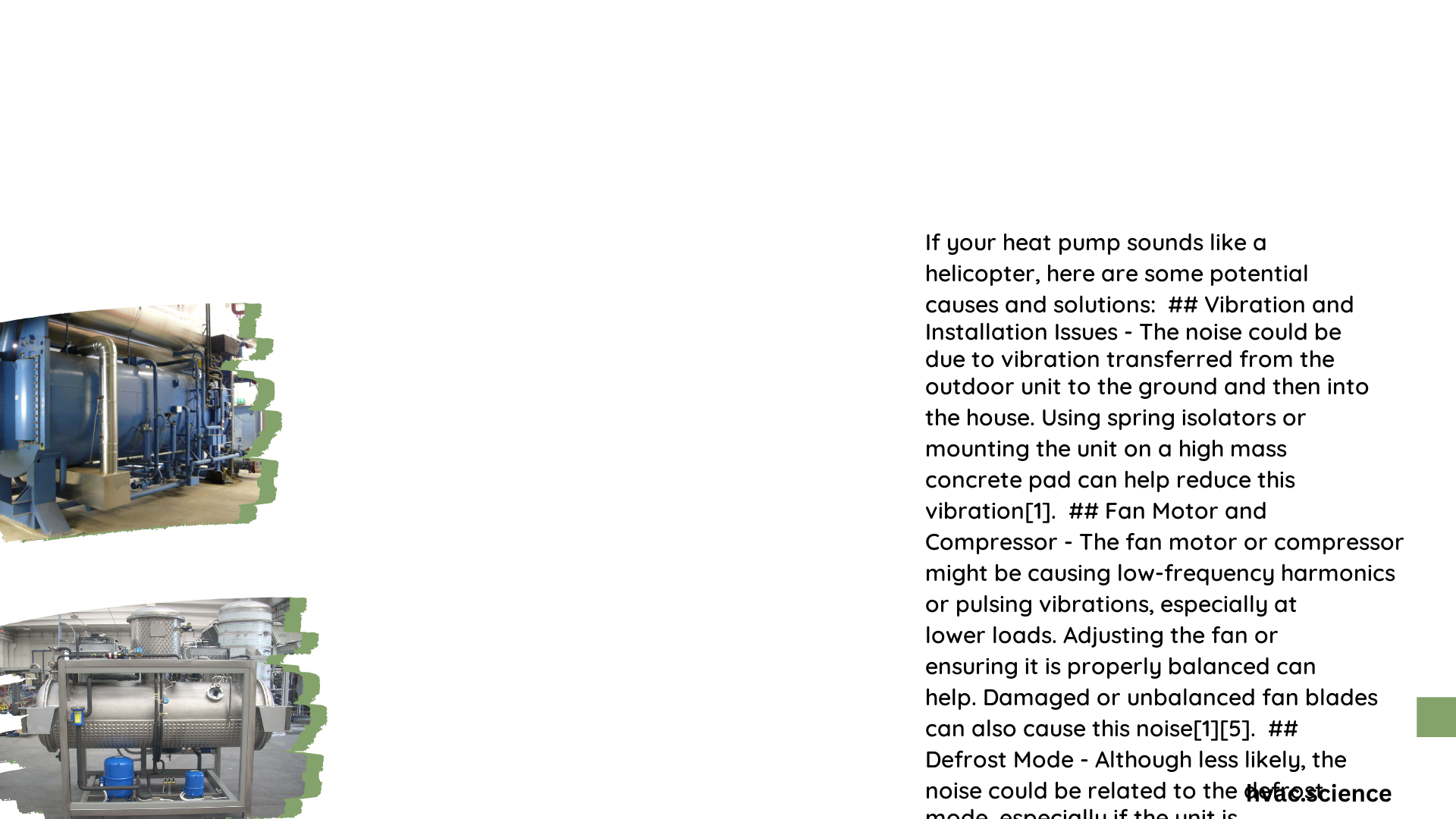Heat pumps producing helicopter-like sounds are a common concern for homeowners. These low-frequency vibrations, typically around 40 Hz, can be disruptive and alarming. The noise is often associated with the heat pump’s operation in low-heating mode, particularly when the unit is modulating up and down. Understanding the causes of these sounds and potential solutions is crucial for maintaining a comfortable living environment and ensuring optimal heat pump performance.
Why Does My Heat Pump Sound Like a Helicopter?
The helicopter-like sound from a heat pump is primarily caused by low-frequency vibrations generated by the compressor and fan motor. These vibrations can be amplified by the house structure, especially if the outdoor unit is not properly isolated. The sound is most noticeable during low-load operations, typically in the heating mode.
Factors contributing to this issue include:
- Improper installation
- Lack of vibration isolation
- Loose components
- Environmental conditions
- Age and condition of the heat pump
What Are the Characteristics of Helicopter-Like Sounds from Heat Pumps?

The helicopter-like sounds produced by heat pumps have distinct characteristics:
- Frequency Range: Typically around 40 Hz
- Sound Level: Can exceed the normal 40-60 dB range of quiet heat pumps
- Perception: Often described as a pulsing or throbbing sound
- Occurrence: Most noticeable during low-load operations, especially in heating mode
These sounds are different from the normal operational noises of a heat pump, which are usually steady humming or buzzing sounds.
How Do Noisy Heat Pumps Compare to Quiet Ones?
| Aspect | Noisy Heat Pumps | Quiet Heat Pumps |
|---|---|---|
| Sound Level | Can exceed 60 dB | 40-60 dB |
| Frequency | Low-frequency vibrations (around 40 Hz) | Higher frequency, less noticeable |
| Perception | Pulsing, throbbing, helicopter-like | Steady hum or buzz |
| Impact on Living Space | Can be felt throughout the house | Minimal impact on indoor comfort |
What Mechanical Components Cause Helicopter-Like Sounds in Heat Pumps?
The primary mechanical components responsible for helicopter-like sounds in heat pumps are:
- Compressor: The heart of the heat pump, it can generate low-frequency vibrations during operation.
- Fan Motor: The fan blades can create pulsing vibrations, especially at lower speeds.
- Mounting Hardware: Loose or improperly installed mounting can amplify vibrations.
How Do Installation Techniques Affect Heat Pump Noise Levels?
Proper installation is crucial in minimizing heat pump noise. Key techniques include:
- Using spring isolators with at least 0.5″ of static deflection
- Mounting the outdoor unit on a heavy concrete pad
- Ensuring proper clearance around the unit
- Using flexible connections for refrigerant lines
Improper installation can lead to vibration transfer to the house structure, amplifying the perceived noise levels.
What Role Does Maintenance Play in Reducing Heat Pump Noise?
Regular maintenance is essential in preventing and addressing heat pump noise issues:
- Tightening loose components
- Cleaning or replacing air filters
- Checking and adjusting refrigerant levels
- Inspecting and cleaning the fan blades
- Ensuring proper lubrication of moving parts
Neglecting maintenance can lead to increased noise levels and reduced efficiency over time.
How Do Environmental Conditions Impact Heat Pump Noise?
Environmental factors can significantly influence heat pump noise:
- Cold Weather: Can cause ice buildup and trigger defrost mode, leading to additional noises
- Humidity: High humidity can affect the unit’s performance and potentially increase noise
- Surrounding Structures: Nearby walls or fences can reflect sound, amplifying the perceived noise
Understanding these factors can help in choosing the optimal location for the heat pump installation.
What Are Effective Solutions for Reducing Heat Pump Helicopter Sounds?
To address heat pump helicopter sounds, consider the following solutions:
- Improve Isolation: Install better vibration isolators or a more substantial mounting pad.
- Adjust Operation: If possible, adjust the heat pump settings to avoid prolonged operation in low-load conditions.
- Professional Assessment: Have an HVAC professional evaluate the system for potential issues or necessary upgrades.
- Sound Barriers: Install sound barriers or enclosures around the outdoor unit, ensuring proper airflow.
- Upgrade Components: Consider replacing older or worn components with newer, quieter models.
Implementing these solutions can significantly reduce the helicopter-like sounds and improve overall heat pump performance.
When Should I Seek Professional Help for Heat Pump Noise Issues?
Seek professional help if:
- The noise persists after basic troubleshooting
- There’s a sudden increase in noise levels
- You notice a decrease in heating or cooling efficiency
- The unit is more than 10 years old
- You’re unsure about performing maintenance or adjustments yourself
A qualified HVAC technician can accurately diagnose the issue and provide appropriate solutions.
By understanding the causes of helicopter-like sounds in heat pumps and implementing proper installation, maintenance, and troubleshooting techniques, homeowners can enjoy the benefits of their heat pump systems without disruptive noise issues.
References:
1. GreenBuildingAdvisor – Noisy Minisplit in Low-Heating Mode
2. Parker & Sons – Is It Normal to Have a Noisy Heat Pump?
3. Precision Comfort – Understanding Heat Pump Noises
